‘Respect’ strikes an inspiring chord
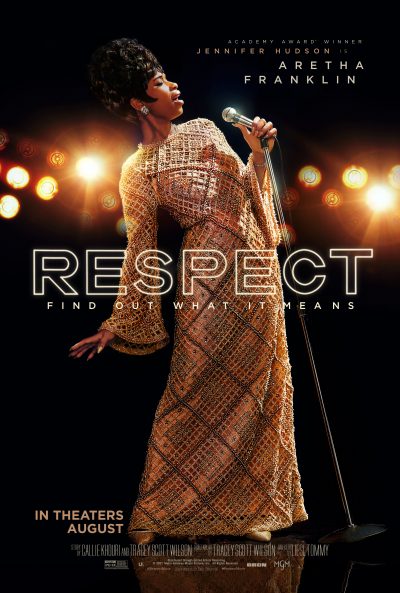
“Respect”(2021). Cast: Jennifer Hudson, Forest Whitaker, Marlon Wayans, Mary J. Blige, Marc Maron, Skye Dakota Turner, Kimberly Scott, Audra McDonald, Hailey Kilgore, Tituss Burgess, Gilbert Glenn Brown, Tate Donovan, Albert Jones, Saycon Sengbloh, LeRoy McClain, Heather Headley, Brenda Nicole Moorer, Lodric D. Collins. Director: Liesl Tommy. Screenplay: Tracey Scott Wilson. Story: Callie Khouri and Tracey Scott Wilson. Web site. Trailer.
Becoming ourselves is often a challenging process. We may have difficulty feeling our way through a cloudy morass of ideas and suggestions, and we might be unsure how to separate the good from the bad. This can be particularly daunting when we’re young, bombarded by others who think they know what’s best for us, leading to confusion and uncertainty that carries on into adulthood. So how we sort this out? It certainly helps to have inspiring examples to show us the way to find our true selves, as seen in the uplifting new biopic, “Respect.”
When telling the life story of an iconic and complicated figure like soul singer Aretha Franklin (1942-2018) (Jennifer Hudson), it can be difficult to get everything right. Decisions regarding what should and shouldn’t be included in such a film can be fraught with difficult choices, some of which will undoubtedly disappoint while others will be perfectly spot-on. And considerations like these almost assuredly had to have gone into the process of devising the narrative and screenplay for the biopic of this storied entertainer and activist, the result of which has drawn decidedly mixed reactions from viewers and critics. For my money, however, director Liesl Tommy’s debut feature mostly gets it right.
“Respect” focuses on a 20-year period in Franklin’s life, from her upbringing in 1952 as a prodigious young gospel singer in the Detroit Baptist church where her supportive but somewhat overbearing father, Rev. C.L. Franklin (Forest Whitaker), served as pastor, through her rise to international stardom as a recording artist and concert performer, to the 1972 making of a gospel album, Amazing Grace, a risky venture that marked a return to her roots and became one of the all-time best-selling LPs in this musical genre. It’s a story arc that essentially goes full circle, examining some of the most crucial events in her career and in her life and showing how the Queen of Soul came to find her voice as a performer, as a civil rights advocate, and, perhaps most importantly, as an individual.
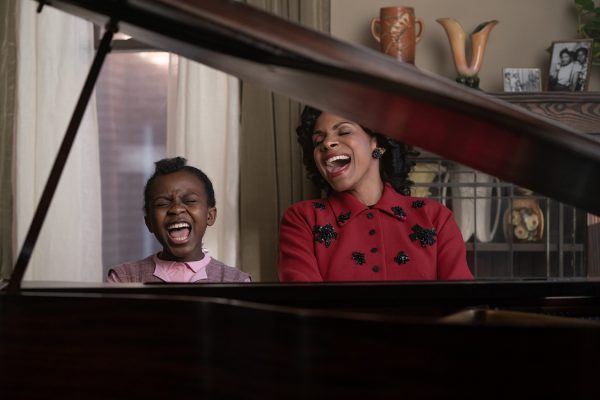
The story opens with a young Aretha (Skye Dakota Turner) impressively belting out a musical number at one of the many house parties hosted by her father, gatherings that featured eclectic mixes of family members, church parishioners, and rising and established entertainers, such as the young artist’s idol, Dinah Washington (Mary J. Blige). However, even though these soirees were held in the home of a pastor, they weren’t always wholesome, innocent affairs, as young Aretha found out when she was sexually abused and became pregnant at age 12 and again two years later, incidents that produced two sons – and that she rarely spoke about throughout the rest of her life.
During her childhood, Aretha often took comfort from her circumstances in the company of her mother, Barbara (Audra McDonald), who had divorced from Aretha’s father. Such solace was missing when she needed it most, however, due to Barbara’s death just before Aretha’s tenth birthday. Most motherly duties subsequently fell to Aretha’s grandmother, Rachel (Kimberly Scott), a protective, no-nonsense guardian who often intervened on her granddaughter’s behalf.
In the years that followed, Aretha took to music as a means to overcome the grief from losing her mother, learning how to play piano and singing gospel in her father’s church. Her powerful voice and charismatic presence made her a sensation while in her teens, eventually helping her land a recording contract with Columbia Records in 1960. With the managerial assistance of her father and the robust backing of record producer John Hammond (Tate Donovan), Aretha appeared to be on her way.
However, after a string of less than successful efforts over the course of six years, Aretha’s career failed to take off. In large part this was due to poor material choices – many of which were made by her father – as well as overproduced accompaniment that often overshadowed the power of Aretha’s voice, inhibiting her natural musicality from shining through. She sounded more like an easy listening artist than the musical powerhouse she was capable of being. So, when her Columbia contract expired, it was time to make a change.
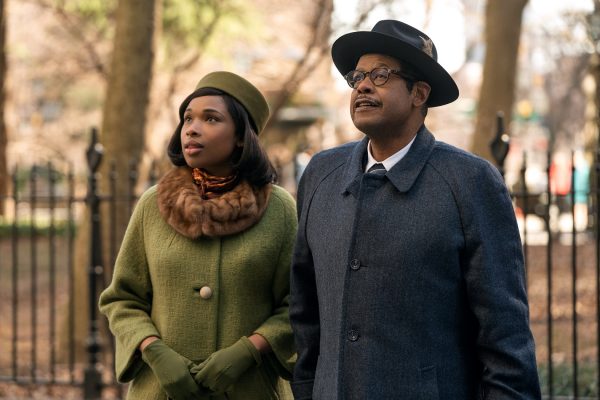
In 1966, producer Jerry Wexler (Marc Maron) convinced Aretha to sign with Atlantic Records. Wexler wanted to tap into Aretha’s gospel roots and bring them out in her music, something that Hammond and Columbia failed to do. He was also willing to give her considerable leeway in forging her own sound, something her now-manager and husband Ted White (Marlon Wayans) was encouraging her to do. It proved to be just what Aretha needed to jump-start her career, launching her into a period in which she had a string of hits, including “I Never Loved A Man (The Way I Love You),” “You Make Me Feel Like a Natural Woman” and, of course, her signature piece, “Respect,” an Otis Redding song she reworked and made her own. She appeared to have found her voice at last.
Throughout this period, Aretha exercised her voice in other ways, too, becoming an ardent supporter of the civil rights and women’s rights movements. She frequently lent her time and support to these efforts and became fast friends with Rev. Dr. Martin Luther King Jr. (Gilbert Glenn Brown), a longtime family acquaintance. Sadly, she would also later sing at the civil rights leader’s funeral after his 1968 assassination. But, during this time, she earned considerable recognition for her efforts in these areas. In fact, her hit “Respect” even became a rollicking de facto anthem for these emerging social movements.
However, just as Aretha’s career began to soar, she also began experiencing a number of problems in her personal life. Her marriage to Ted was in serious trouble; he was physically abusive, and his frequent managerial and creative differences with Aretha’s father and with her producer caused difficulties in keeping her career focused and on track. Finally, by 1968, she had had enough, divorcing him the following year.
Nevertheless, the stress of years of various issues was beginning to take its toll. Aretha began having problems with alcohol abuse, seriously affecting her in multiple ways. She had loving support from many people, including Ken Cunningham (Albert Jones), her partner and road manager at the time, Rev. James Cleveland (Tituss Burgess), longtime friend and musical collaborator, and her siblings, Erma (Saycon Sengbloh), Carolyn (Hailey Kilgore) and Cecil (LeRoy McClain). But overcoming her condition ultimately took intervention from a higher power, a development that prompted the next step in Aretha’s evolution.
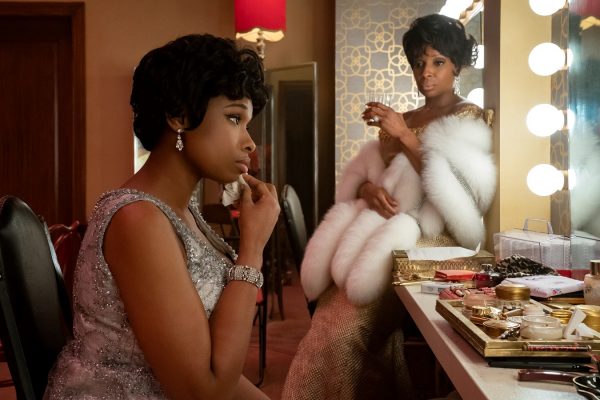
In 1972, Aretha undertook a project that Wexler was convinced was a big gamble. She wanted to return to her origins and record a gospel album, a venture that she believed she needed to do to heal herself. The album, recorded over two nights at the New Temple Missionary Baptist Church in Los Angeles, featured Aretha with accompaniment by Cleveland and the Southern California Community Choir. The event was also filmed as a documentary (though production problems delayed release of the film until 2018). Prior to the event’s staging, it was unclear how it would turn out. But, given that the stakes for Aretha were higher than any financial or artistic considerations, it was something she knew she needed to do. And, as things turned out, this was in many ways the crowning achievement in helping her at last find the voice that she had been looking for all these years.
For all practical purposes, the point of finding one’s voice is finding one’s true self. This may not be an easy process given everything that’s involved. We may not know what to look for. We may allow our search to become distracted by other diversions or distorted by the opinions of others. We may even deny to ourselves what we discover. In each of these cases, though, it all comes down to what we believe about ourselves. And, until we get a firm handle on that by recognizing and embracing the authenticity involved, we’ll find ourselves having to continue the search. But identifying and accepting those beliefs is crucial as they serve to shape our existence, a product of the conscious creation process, the philosophy that maintains we draw upon these resources in manifesting our reality.
As the film shows, Aretha wrestled with this issue, especially during her upbringing and on into young adulthood. Many external forces, such as her domineering father, her abusive husband and record company executives, all thought they knew what was best for her, and she frequently willingly complied. The problem in that, however, is that Aretha never allowed herself to be herself. Consequently, this kept her from discovering who and what she was meant to be. In doing what she was told and what was expected of her, she never let her true self shine through.
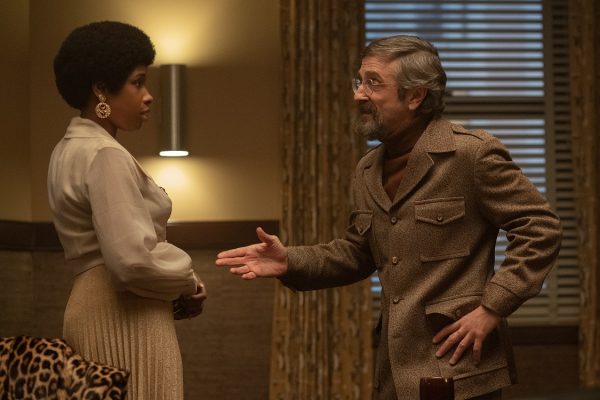
This became acutely apparent during a nightclub performance when Aretha sought to sing a signature piece by her idol Dinah Washington, who was in attendance at the time. Much to Aretha’s surprise, Ms. Washington erupted in a fury; what Aretha thought was a kind tribute was seen by her mentor as a slap in the face. The incident led to a sternly worded conversation back stage in which Washington told Aretha that she needed to be herself, not shamelessly borrow from others, if she ever expected to be the sensation she was capable of becoming.
That exchange obviously had an impact, as Aretha began searching in earnest to find herself. It’s not that she didn’t know how; after all, her activism in the civil rights and women’s rights movements demonstrated that Aretha was perfectly capable of standing up for what she believed in. Now all she had to do was translate that ability into her music. And, before long, she did.
Aretha’s affiliation with Jerry Wexler helped immensely. His willingness to give Aretha the freedom to do what she wanted was tremendously liberating. She embraced it, and that became apparent in her work. It inspired her to believe in herself, providing her with the courage and confidence she needed to become herself, both as an artist and as an individual. In addition to recording music that suited her, this change enabled Aretha to make other alterations in her life, such as divorcing her abusive husband.
Aretha’s recordings soon became reflections of who she was. This is perhaps most obvious in the film’s title number. By learning how to tap into her own inner being, Aretha imbued herself with the respect – or, perhaps more precisely, self-respect – needed to succeed both in her calling and as a self-empowered individual. And, in doing so, she set an inspiring example for those facing similar circumstances, aiding them in becoming who they were meant to be as well.
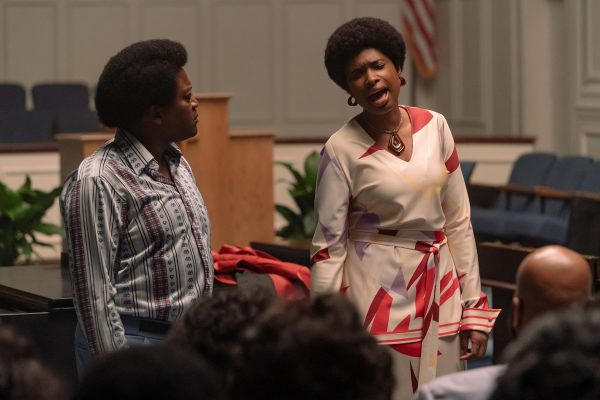
This is not to suggest that Aretha did everything on her own. She had ample able assistance as well. For example, Wexler was nearly always in her corner, especially when he could see that she was receiving bad advice, particularly from her husband. She also had the support of session musicians from Muscle Shoals, as well as her sisters Erma and Carolyn. This is apparent in scenes showing how several of Aretha’s songs came together, most notably the collaboration between her and her siblings in bringing “Respect” to life. These acts of co-creation not only show what can result from these kinds of joint efforts, but they also illustrate how the whole can indeed become more than the sum of its parts.
All of these developments provide evidence of the personal evolution we’re each capable of. As conscious creation practitioners know well, one of the key principles of this philosophy is that everything is in a constant state of becoming. That was certainly true for Aretha, who clearly came into her own over time, evolving from someone who held herself back to someone who found the way to be her own person with her own singular means of expression. It’s something to which we should all aspire, and Aretha unquestionably provided us with an excellent example to emulate.
By taking the steps that she did, Aretha lived out her destiny, what’s better known in conscious creation circles as value fulfillment, the practice of being our best, truest selves for the betterment of ourselves and those around us. Without a doubt, the Queen of Soul produced some of the most memorable music ever recorded, providing fans of the art form with hours of unforgettable listening. But, more than that, she showed us how to stand up for ourselves, how to take charge of our lives and how to be the people we were meant to be. Not bad for a little church choir girl from Detroit.
Initial reviews of this offering have not been especially kind. “Respect” has been compared to many other music industry biopics, such as the Tina Turner biography “What’s Love Got To Do With It?” (1993), with many critics contending that this release is unimaginative and derivative. However, such comparisons are patently unfair in my estimation. Indeed, what are filmmakers supposed to do in a situation like this – change the nature of the story for the sake of originality? That hardly seems like a realistic solution, especially for a story in which the events that constitute it are known and established.

With biographical pictures like this, I believe they need to be judged on the merits of the filmmaking, not necessarily on how inventive they are in terms of narrative or screenplay, for sometimes there’s no way working around what the film needs to depict in order to be factual and accurate. To that end, I must admit that I was favorably impressed with this offering, especially in the outstanding Oscar-worthy lead performance of Jennifer Hudson, the supporting portrayal of Skye Dakota Turner as Aretha’s younger self and the dazzling musical numbers, all of which are absolute knock-outs. Admittedly the film is somewhat formulaic (some might say predictable or even trite in certain sequences) and a bit overlong in its attempt to capture as much of Ms. Franklin’s life story as possible. Nevertheless, in the greater scheme of things, “Respect” is a capably made, exceedingly entertaining offering that’s far from deserving of most of the petty sniping that’s been directed its way. Doing justice to the Queen of Soul is a daunting prospect, to be sure, but I find it difficult to believe that she would be disappointed by the results. The film is playing theatrically and is available for streaming online.
Sadly, “respect” is one of those qualities that is becoming increasingly scare in this contentious day and age. All too often those who hold conflicting views from one another are quick to attack and siphon off whatever reserves of respect that their opponents may have, leading to bitterness, cynicism and discouragement. Aretha’s story, her signature hit and now this film all remind us of how important it is today to hold on to our respect, both for ourselves and for others, even if that requires issuing clarion calls to demand it. It’s a message we had better take to heart given the way things are headed, for, if we don’t, attempts at retrieving our respect at that point may not prove fruitful – and we’ll all end up in a bigger mess than we know what to do with.
Copyright © 2021, by Brent Marchant. All rights reserved.



